Embracing Slow Travel and Slow Food: Pioneering Sustainable and Meaningful Tourism
14 min readExploring the transformative impact of Slow Travel and Slow Food, this article delves into how these movements promise a more sustainable, inclusive, and culturally rich tourism industry. By prioritizing depth over breadth and fostering genuine connections, they advocate for a tourism model that benefits local economies, preserves cultural heritage, and enhances the travel experience.
The tourism industry has boomed, offering a glimpse of the world’s wonders. But alongside growth comes challenges – environmental strain, cultural homogenization, and economic benefits concentrated in a few hands. In a world that is increasingly fast-paced and where the value of experiences is often measured by their quantity rather than their quality, the concepts of Slow Travel and Slow Food emerge as revolutionary paradigms that promise a more balanced, inclusive, and equitable approach to tourism. By encouraging travelers to immerse themselves deeply in their destinations, these movements are not just changing how we travel, but also how we connect with local cultures, economies, and ecosystems.
This article explores how the principles of Slow Travel and Slow Food can foster a more sustainable and meaningful tourism industry, making people travel deeper rather than wider.
The Philosophy of Slowness
At the heart of both Slow Travel and Slow Food is a commitment to slowness—a deliberate deceleration that emphasizes quality over speed, depth over breadth, and connections over transactions. This philosophy advocates for a more conscious approach to travel, where the journey itself is as important as the destination, and where meals are not just consumed but savored.
A 2023 study from American Express revealed that 85 percent of respondents want to visit a place where they can truly experience the local culture, and 78 percent are interested in going on vacations that support local communities.
Slow Travel: Journeying with Purpose
[embedded content]
Slow Travel encourages travelers to spend more time in fewer places, allowing for a deeper understanding and appreciation of the local culture, history, and environment. This approach not only leads to a more fulfilling and enriching travel experience but also mitigates the negative impacts of mass tourism, such as overcrowding and resource depletion. By slowing down the pace of travel, individuals can gain a deeper appreciation for the intricacies of a destination, fostering a more profound understanding of its history, traditions, and way of life. This not only enriches the traveler’s experience but also promotes cultural exchange and mutual respect between visitors and locals, leading to a more inclusive and equitable tourism ecosystem.
By staying longer in a destination, travelers contribute more significantly to the local economy, supporting small businesses and reducing the economic leakage often associated with conventional tourism.
Slow Travel is a philosophy that prioritizes quality over quantity. It encourages travelers to:
- Extend their stays: Immersing themselves in a destination, going beyond tourist hotspots to engage with local life and traditions.
- Travel with purpose: Choosing experiences that align with their interests, be it learning a craft, volunteering, or delving into historical narratives.
- Embrace local transportation: Opting for bicycles, walking tours, or public transport to connect with the landscape and people.
Slow Food: A Taste of Place
Similarly, Slow Food champions the idea of eating locally sourced, high-quality food, which is produced in a way that respects the environment, animal welfare, and the health of consumers. Through Slow Food experiences such as farm-to-table dining, cooking classes with local chefs, and visits to traditional markets, travelers can gain insight into the cultural significance of food and its role in community life. By supporting local food producers and businesses, travelers contribute to the economic empowerment of the destination, promoting a more equitable distribution of tourism benefits. This not only enhances the travel experience but also supports local farmers, reduces food miles, and preserves culinary traditions.
Slow Food, a companion movement, celebrates food as a cultural touchstone. It advocates for:
- Seasonal and regional ingredients: Supporting local farmers and experiencing the unique flavors of a place.
- Traditional foodways: Learning about local cooking techniques and appreciating the cultural significance of food.
- Sustainable production: Encouraging responsible sourcing practices that benefit the environment and local communities.
Driving Balanced Tourism
[embedded content]
By integrating the principles of Slow Travel and Slow Food, we can drive a more balanced form of tourism that benefits both travelers and host communities. This model promotes inclusivity by ensuring that the economic benefits of tourism are widely distributed across communities, particularly by supporting local artisans, farmers, and small business owners. Moreover, it fosters equitable access to the tourism market, enabling diverse voices and stories to be heard and appreciated. By embracing the principles of these movements, travelers can engage more deeply with the places they visit, forging lasting connections and memories that transcend the surface level of tourism, and ensuring that local communities are active participants in and beneficiaries of tourism development. This, in turn, promotes social equity, preserves cultural heritage, and safeguards the environment for future generations of travelers to enjoy.
When combined, Slow Travel and Slow Food create a powerful recipe for balanced tourism:
Deeper Connections: Travelers develop meaningful relationships with locals, fostering cultural exchange and understanding.
- Economic Equity: By supporting local businesses and farmers, tourism revenues are distributed more fairly.
- Environmental Stewardship: Slow Travel emphasizes responsible travel practices, minimizing ecological impact.
- Cultural Preservation: Travelers appreciate and respect local customs and traditions, contributing to cultural preservation.
Inclusive Economic Benefits
Slow Tourism encourages spending on local experiences and products, which helps to keep the economic benefits within the community. This inclusive approach supports a diverse range of stakeholders, from local guides and artisans to family-run restaurants.
Slow Travel and Slow Food are not just about extended vacations. It’s a mindset shift that encourages travelers to be intentional, respectful, and engaged. It’s about seeking authenticity, appreciating cultural nuances, and savoring experiences. This mindful approach fosters a more balanced and equitable tourism ecosystem, leaving a positive impact on both travelers and destinations.
Slow Travel and Slow Food also promote inclusivity:
- Accessibility: Slower itineraries allow for a more relaxed pace, making travel more accessible for those with disabilities or families with young children.
- Community-Based Tourism: Homestays, farm stays, and local food tours enable travelers to connect directly with communities, fostering mutual respect and understanding.
- Preserving Heritage: By supporting traditional crafts and foodways, Slow Travel helps safeguard cultural heritage for future generations.
The “Slow Food Travel” Initiative in Various Countries
In 1999, the Slow City movement, known as Cittaslow, was born in Italy. It aimed to promote a better quality of life by encouraging cities to adopt sustainable practices, protect their cultural heritage, and prioritize local food. This movement has spread to over 30 countries, with cities like Orvieto and Bra in Italy becoming pioneers in promoting slow travel and slow food.
Mold in Wales was one of the first towns to join the Cittaslow movement. They revitalized their town center with pedestrian-friendly spaces, supported traditional food producers, and established farmers’ markets. The Slow approach boosted community pride, visitor engagement, and the local economy.
[embedded content]
The Slow Food movement, with its focus on local, sustainable, and high-quality food production and consumption, has made significant impacts in various parts of the world. The Slow Food movement can play a critical role in sustaining local food systems, preserving culinary heritage, and supporting sustainable tourism. By focusing on the uniqueness of local cuisines and promoting sustainable practices, destinations can offer enriching experiences for travelers and valuable economic opportunities for local communities.
The Slow Food Organization has launched the “Slow Food Travel” initiative, aiming to create travel experiences that are based on discovering and preserving local food and agricultural traditions. This initiative promotes destinations that offer immersive experiences, such as visiting local producers, participating in cooking classes, and tasting traditional dishes.
Slow Food has also partnered with AirBnB to connect travelers to experiences that must be tailored to offer participants the chance to discover food products, techniques, and cultures through the lens of Slow Food. These experiences have to be crafted in accordance with the Slow Food principles of good, clean and fair, ensuring that your experience is delicious, socially responsible, and sustainable.
The concept of Food Miles has gained traction worldwide as a way to reduce carbon emissions and support local food producers. Various destinations have implemented campaigns to promote the consumption of locally sourced food, encouraging travelers to opt for restaurants and markets that prioritize local and seasonal ingredients. This initiative supports sustainable agriculture, reduces food waste, and offers a more authentic dining experience.
Incorporating Slow Travel and Slow Food principles, several destinations around the world have successfully leveraged these movements to promote sustainable tourism, revitalize local economies, and protect cultural and natural heritage. Here are a few standout examples and successful campaigns:
1. Cinque Terre, Italy: Preserving Culture Through Slow Travel

Cinque Terre, a picturesque region of Italy, has become a poster child for managing the impact of tourism through slow travel principles. Faced with the challenges of overtourism, local authorities and communities have implemented measures to encourage longer stays and off-season visits. One successful initiative is the promotion of the Cinque Terre Card, which provides access to trails, trains, and ecological buses, encouraging visitors to explore the area more sustainably. This approach not only reduces the environmental footprint but also spreads economic benefits throughout the year.
2. Spain – Slow Food Travel
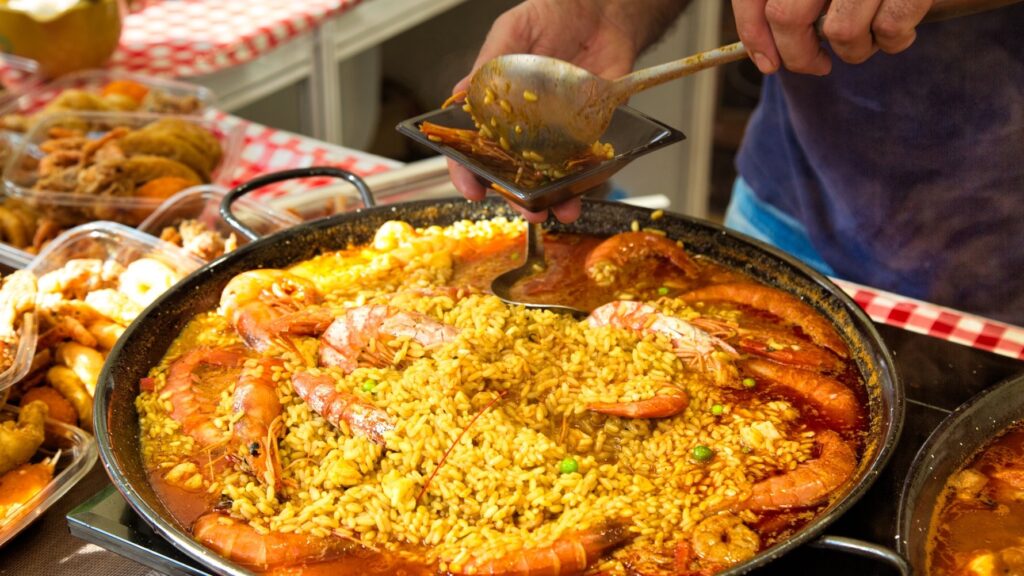 In Spain, the region of Catalonia has embraced Slow Food travel as a unique tourism offering. The network of Slow Food Travel experiences introduces travelers to local culinary traditions and values, such as organic agriculture, traditional farming practices, and artisanal food production. These initiatives have created economic opportunities for local communities while preserving the region’s gastronomic heritage.
In Spain, the region of Catalonia has embraced Slow Food travel as a unique tourism offering. The network of Slow Food Travel experiences introduces travelers to local culinary traditions and values, such as organic agriculture, traditional farming practices, and artisanal food production. These initiatives have created economic opportunities for local communities while preserving the region’s gastronomic heritage.
3. Hokkaido, Japan: Slow Food and Agricultural Tourism
 A woman strolls through a lavender field at Saika no sato, a flower park in Nakafurano town, on Japan’s northern island of Hokkaido July 20, 2011. REUTERS/Yuriko Nakao (JAPAN – Tags: ENVIRONMENT SOCIETY).
A woman strolls through a lavender field at Saika no sato, a flower park in Nakafurano town, on Japan’s northern island of Hokkaido July 20, 2011. REUTERS/Yuriko Nakao (JAPAN – Tags: ENVIRONMENT SOCIETY).
Hokkaido, known for its pristine landscapes and rich culinary traditions, has embraced Slow Food principles by promoting agricultural tourism. Visitors are encouraged to participate in farm stays, where they can experience the local way of life and learn about sustainable farming practices. This initiative not only educates tourists about the importance of local, seasonal food but also supports the rural economy. Hokkaido’s emphasis on preserving its culinary heritage through tourism has made it a leading example of how slow food can contribute to sustainable travel.
4. Costa Rica: A Model for Ecotourism and Slow Travel
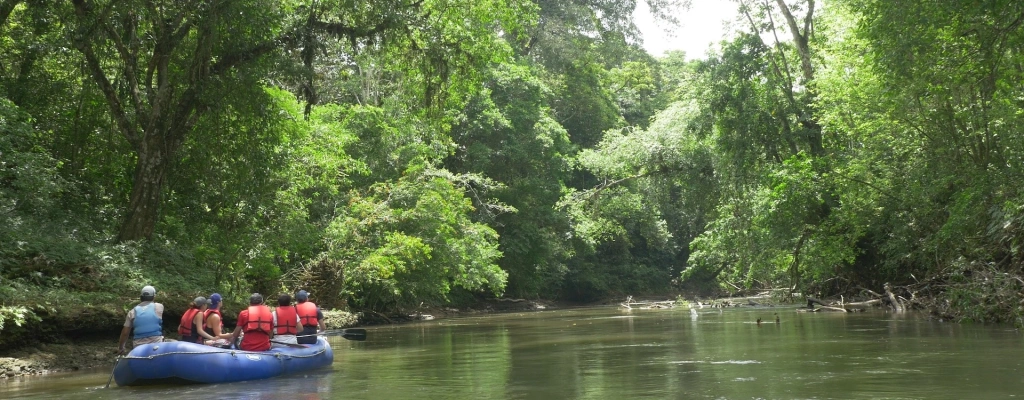 Costa Rica has long been celebrated for its commitment to conservation and sustainable tourism. By focusing on ecotourism and promoting slow travel experiences, such as wildlife watching, hiking in national parks, and community-based tourism, Costa Rica has managed to protect its biodiversity while providing meaningful experiences to visitors. This approach has not only preserved the country’s natural beauty but has also ensured that the benefits of tourism are distributed across local communities, contributing to economic and social development.
Costa Rica has long been celebrated for its commitment to conservation and sustainable tourism. By focusing on ecotourism and promoting slow travel experiences, such as wildlife watching, hiking in national parks, and community-based tourism, Costa Rica has managed to protect its biodiversity while providing meaningful experiences to visitors. This approach has not only preserved the country’s natural beauty but has also ensured that the benefits of tourism are distributed across local communities, contributing to economic and social development.
5. “Albergo Diffuso” in Italy: Revitalizing Rural Communities
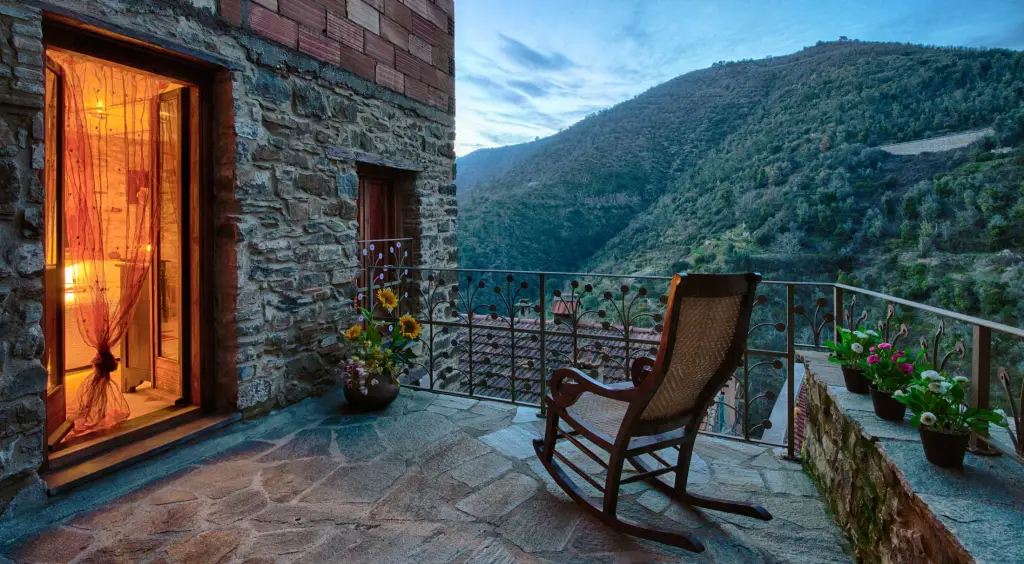 The “Albergo Diffuso” or “scattered hotel” concept in Italy is a brilliant example of slow travel revitalizing rural areas. This innovative hospitality model involves converting abandoned houses in small villages into hotel rooms or apartments, providing an authentic experience for travelers while preserving the town’s architectural heritage. Guests can enjoy local food, culture, and traditions, contributing to the local economy. This model has been particularly successful in regions like Abruzzo and Sardinia, where it has helped to combat depopulation and economic decline.
The “Albergo Diffuso” or “scattered hotel” concept in Italy is a brilliant example of slow travel revitalizing rural areas. This innovative hospitality model involves converting abandoned houses in small villages into hotel rooms or apartments, providing an authentic experience for travelers while preserving the town’s architectural heritage. Guests can enjoy local food, culture, and traditions, contributing to the local economy. This model has been particularly successful in regions like Abruzzo and Sardinia, where it has helped to combat depopulation and economic decline.
6. Barbados: Championing Local Foods and Heritage
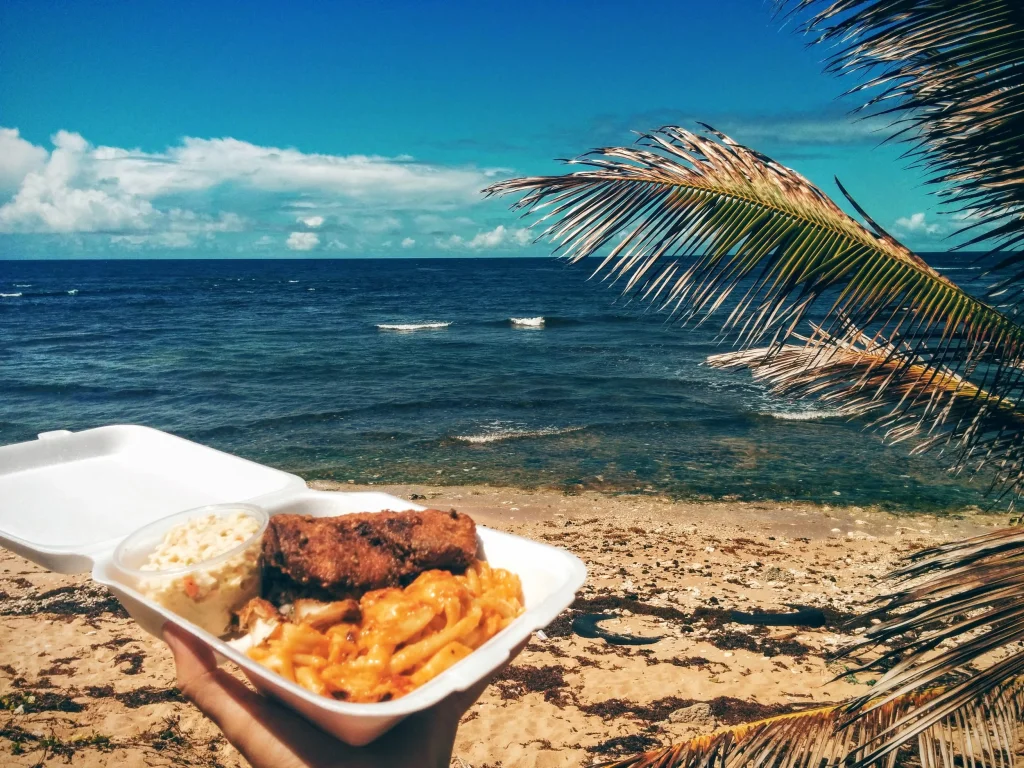 In Barbados, the Slow Food movement has been instrumental in revitalizing interest in indigenous crops and traditional cooking methods. One of the key initiatives has been the promotion of the “Slow Food Barbados,” which aims to raise awareness about sustainable food practices and celebrate Barbadian cuisine. The festival includes workshops, cooking demonstrations, and movie screenings that focus on food sustainability issues.
In Barbados, the Slow Food movement has been instrumental in revitalizing interest in indigenous crops and traditional cooking methods. One of the key initiatives has been the promotion of the “Slow Food Barbados,” which aims to raise awareness about sustainable food practices and celebrate Barbadian cuisine. The festival includes workshops, cooking demonstrations, and movie screenings that focus on food sustainability issues.
A significant focus in Barbados has been on the preservation of heritage foods. For example, efforts have been made to protect and promote the use of local ingredients like the breadfruit, flying fish, and the Barbados Blackbelly sheep. These efforts not only help in conserving the island’s culinary heritage but also support local farmers and fishermen by creating a market for their products.
The Barbados chapter of Slow Food also engages in educational initiatives, teaching schoolchildren about the importance of local foods and sustainable agriculture. By integrating these principles into the community, Barbados is strengthening its food sovereignty and encouraging a more sustainable approach to tourism, where visitors can enjoy authentic, locally-sourced meals that reflect the island’s culinary traditions.
7. Thailand: Slow Food in a Fast-Growing Economy
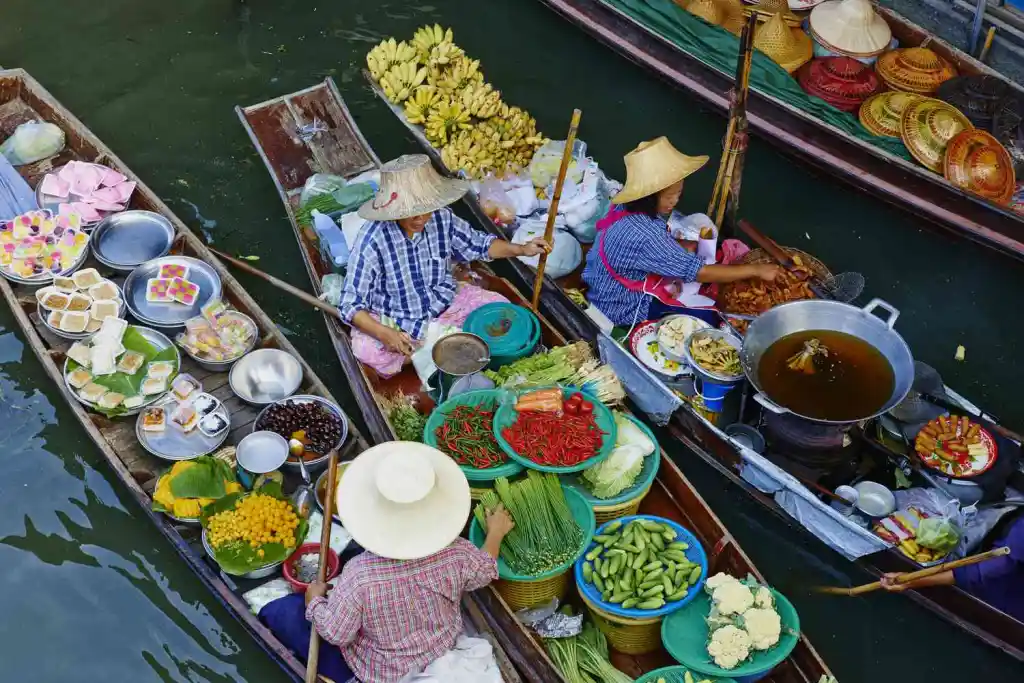 Thailand’s vibrant culinary scene is a testament to the country’s rich cultural heritage and biodiversity. The Slow Food movement in Thailand focuses on safeguarding the country’s diverse food traditions amidst rapid modernization and the globalization of its food systems.
Thailand’s vibrant culinary scene is a testament to the country’s rich cultural heritage and biodiversity. The Slow Food movement in Thailand focuses on safeguarding the country’s diverse food traditions amidst rapid modernization and the globalization of its food systems.
One significant effort has been the establishment of Slow Food communities and the Ark of Taste project in Thailand. The Ark of Taste catalogues and promotes endangered heirloom varieties and traditional foods, and Thailand has contributed numerous products to this list, including native species of rice, fruits, vegetables, and traditional Thai dishes that are at risk of disappearing.
In Chiang Mai, the Slow Food movement has been particularly active, with initiatives that support organic farming and promote the use of local ingredients among restaurants and hotels. The “Slow Food Youth Network Thailand” is another vibrant platform that engages young people in discussions about food sustainability, traditional cooking, and the importance of biodiversity.
In Bangkok, the Slow Food movement has gained momentum, encouraging local communities to reconnect with their food heritage. Slow Food Bangkok is a community-led initiative that promotes sustainable food practices and supports local producers. With a focus on preserving traditional Thai cuisine and promoting small-scale farming, Slow Food Bangkok organizes events such as farmers’ markets, cooking workshops, and food tours. These activities aim to educate the public about the importance of local ingredients, traditional recipes, and sustainable farming methods. By emphasizing the cultural and environmental value of Thailand’s gastronomic heritage, Slow Food Bangkok has not only helped promote sustainable tourism but has also supported local farmers and the preservation of traditional food knowledge.
Thai Slow Food advocates also work closely with indigenous communities to document and preserve traditional food practices and ingredients. These efforts not only contribute to the conservation of Thailand’s culinary heritage but also offer tourists an authentic taste of Thailand’s diverse food culture.
8. Scotland: Slow Adventure
 VisitScotland’s “Slow Adventure” campaign promotes sustainable tourism, encouraging travelers to explore the country’s natural landscapes at a slower pace. It emphasizes meaningful experiences such as kayaking, hiking, and wild camping, while fostering a stronger connection between visitors and the environment. This campaign has not only attracted visitors seeking more immersive experiences but has also benefited local businesses and communities.
VisitScotland’s “Slow Adventure” campaign promotes sustainable tourism, encouraging travelers to explore the country’s natural landscapes at a slower pace. It emphasizes meaningful experiences such as kayaking, hiking, and wild camping, while fostering a stronger connection between visitors and the environment. This campaign has not only attracted visitors seeking more immersive experiences but has also benefited local businesses and communities.
9. Kerala, India: “God’s Own Country”
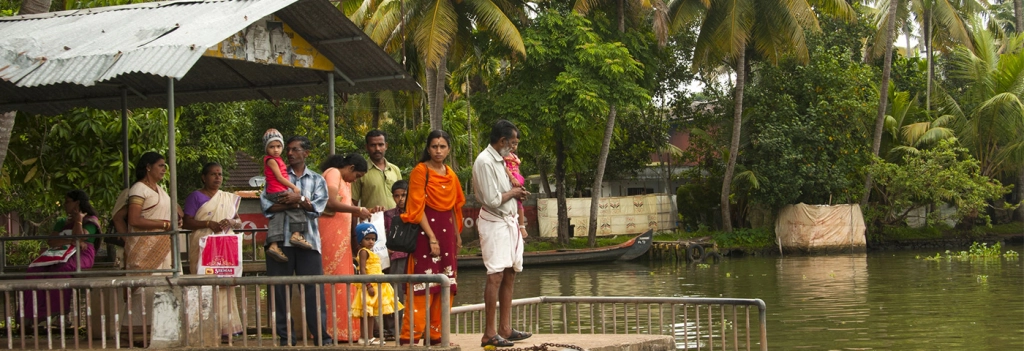 Kerala promotes a responsible tourism model, with a focus on community-based initiatives. Travelers can stay in homestays, participate in local cooking lessons, and discover the region’s diverse flavors and spices. This focus on local experiences distributes tourism benefits and preserves the region’s cultural richness.
Kerala promotes a responsible tourism model, with a focus on community-based initiatives. Travelers can stay in homestays, participate in local cooking lessons, and discover the region’s diverse flavors and spices. This focus on local experiences distributes tourism benefits and preserves the region’s cultural richness.
10. Revitalizing the Iya Valley: A Model of Slow Tourism
[embedded content]
Alex Kerr, an American author and Japanologist, has been pivotal in promoting sustainable tourism and the preservation of traditional Japanese culture through initiatives that closely align with the principles of Slow Travel. His work in Japan, particularly in the Iya Valley on Shikoku Island, stands as a remarkable case study in balancing tourism development with cultural and environmental preservation.
Kerr’s most notable initiative in Japan is his work in the Iya Valley, a remote and scenic area known for its steep mountain slopes and deep valleys. In the 1970s and 1980s, Kerr began buying and restoring traditional thatched-roof houses (kominka) that were falling into disrepair, aiming to preserve the architectural heritage and traditional lifestyles of the region.
Through his company, Chiiori Trust, Kerr transformed these historical homes into accommodations for visitors, offering an immersive experience into traditional Japanese rural life. This approach not only preserved the architectural heritage of the area but also revitalized local economies by attracting tourists interested in authentic experiences away from the urban centers.
Chiiori, meaning “House of the Flute,” is one of the traditional houses Kerr restored. It has become a symbol of his efforts and serves as a hub for cultural exchange, education, and sustainable tourism practices. Chiiori and other restored houses offer visitors the chance to live alongside local residents, participate in traditional crafts, and learn about sustainable living practices.
Kerr’s initiatives have had a significant impact on promoting sustainable tourism in Japan. By emphasizing the value of slow, immersive travel experiences, Kerr has helped to spread awareness about the importance of preserving Japan’s rural landscapes and traditional cultures. His work demonstrates how tourism can be a force for good, contributing to the preservation of cultural heritage while providing meaningful experiences for visitors.
Kerr’s approach aligns with the broader goals of the Slow Travel movement, emphasizing the importance of preserving traditional ways of life and promoting economic models that support local communities. His efforts in the Iya Valley and other parts of Japan have inspired similar initiatives, highlighting the potential for sustainable tourism to revitalize rural areas and safeguard cultural heritage for future generations.
Conclusion
In conclusion, the integration of Slow Travel and Slow Food principles into tourism practices can drive a more sustainable, inclusive, and equitable tourism ecosystem, enabling travelers to journey deeper into the heart and soul of a destination, focusing on quality experiences, cultural exchange, and environmental stewardship.
By slowing down, savoring the moment, and supporting local communities, these movements are paving the way for a more inclusive and equitable tourism ecosystem, and we can create a more meaningful and enriching travel experience for all.
With over 30 years of global travel and tourism expertise, Dr. Jens Thraenhart is the Founding Partner of 25-year-old bespoke strategy consulting firm Chameleon Strategies, the 2nd Vice Chair of the World Tourism Organization’s UNWTO Affiliate Members, the former Chief Executive Officer of the Barbados Tourism Marketing, Inc. (Visit Barbados), the former Executive Director of the Mekong Tourism Coordinating Office, the founder of private-sector-led tourism marketing organization Destination Mekong, and former Board Member of the Caribbean Tourism Organization (CTO).
Previously active in China, in 2009, he co-founded acclaimed marketing agency Dragon Trail and published the China Travel Trends books and website. Jens has also held leadership positions with Destination Canada and Fairmont Hotels & Resorts (now Accor).
As founder of the Destination Film Forum, he is also a big proponent of the power of storytelling, having been recognized as one of the top 10 Most Influential Leaders in Travel in 2022 by Travel Vertical, ranking first in the category of Creativity and Brand Storytelling, and served on the Jury of the Cannes Lion International Film Awards.
Other recognitions for his work include being one of the travel industry’s top 100 rising stars by Travel Agent Magazine in 2003, one of HSMAI’s 25 Most Extraordinary Sales and Marketing Minds in Hospitality and Travel in 2004 and 2005, one of the Top 20 Extraordinary Minds in European Travel and Hospitality in 2014, and honored as one of the Global Travel Heroes in 2021.
He completed his Doctor in Tourism Management at The Hong Kong Polytechnic University and graduated from Cornell University with a Masters in Hospitality Management.
He publishes his three tourism industry blogs: (1) Tourism-Campaigns.com; (2) BalancedTourism.com; (3) PurposePicks.com.




